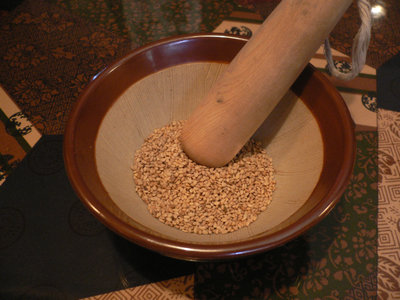One of the more challenging aspects of learning a foreign language is picking up idiomatic expressions, which can be terribly random and confusing to outsiders. For example, the way to express the concept of “brown-nosing” (i.e. kissing up to your boss or teacher) is ごまをする goma o suru, literally meaning “to grind up someone’s sesame seeds for them,” since lickspittle underlings would supposedly grind sesame seeds for their boss in order to win points with him. If you want to try this word out on Japanese people you know, just say goma-suri! (which would mean something like “stop trying to flatter me!”) when a Japanese person praises you for something, then watch them jump out of their shoes in surprise that you know a word like that. Japanese spend many thousands of hours memorizing the strange idioms and turns of phrase we use in English, never quite sure why it could be possible to “rain cats and dogs,” or why something simple is a “piece of cake” or “easy as pie” but not the other way around. As is usually the case with language, asking why something means what it means doesn’t get you very far, so encapsulating what you’re trying to learn as a defined unit and figuring what situations it works best in is usually the best approach.

Griding up sesame seeds is a piece of cake.















